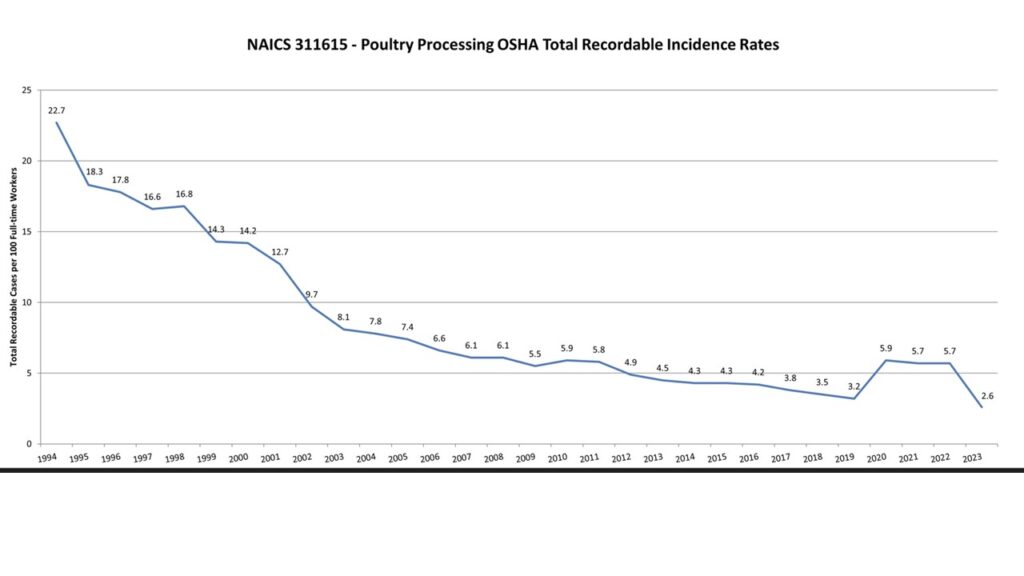The incidence of occupational injuries and illnesses within the poultry sector’s slaughter and processing workforce has fallen below all general industry, manufacturing and food manufacturing levels for the first time since the Department of Labor’s Bureau of Labor Statistics (BLS) began recording injuries and illnesses information in 1994. The poultry industry’s rate of 2.6 injuries per 100 full-time workers was below the rate of 4.7 for similar agricultural industries and lower than 3.6 for the entire food manufacturing sector, all of the manufacturing industries at 2.8, and all of the general industry at 2.7.
Poultry processing’s 2023 incident rate of 2.6 represents an 89 percent decrease from 1994, the oldest data available on the BLS website when the recorded rate was 22.7 and demonstrates the advancements the industry has made in improving safety for its workforce.
 “The poultry industry has always prioritized employee safety and remains dedicated to preventing workplace injuries and illnesses, with a particular focus on musculoskeletal disorders like carpal tunnel syndrome. By embracing ergonomic practices and early medical intervention, and by adopting new technology and automation, the industry has made significant strides in worker safety. We have seen a substantial reduction in injury and illness rates. Nonetheless, the industry remains committed to exploring innovative approaches to further protect our workforce,” stated the Joint Poultry Industry Safety & Health Council in response to the report’s release.
“The poultry industry has always prioritized employee safety and remains dedicated to preventing workplace injuries and illnesses, with a particular focus on musculoskeletal disorders like carpal tunnel syndrome. By embracing ergonomic practices and early medical intervention, and by adopting new technology and automation, the industry has made significant strides in worker safety. We have seen a substantial reduction in injury and illness rates. Nonetheless, the industry remains committed to exploring innovative approaches to further protect our workforce,” stated the Joint Poultry Industry Safety & Health Council in response to the report’s release.
The Joint Poultry Industry Safety & Health Council consists of members from the U.S. Poultry & Egg Association (USPOULTRY), the National Chicken Council (NCC), and the National Turkey Federation (NTF). Collectively, the three organizations represent companies that produce 95 percent of the nation’s poultry products and directly employ more than 350,000 workers.
“Our employees are our most important asset, and their safety is paramount,” said USPOULTRY, NCC, and NTF in response to the report. “The poultry industry has consistently focused on preventing workplace injuries and illnesses, and this latest data reflects the outstanding safety performance we have achieved. Having a lower incident rate than the general industry, manufacturing, and food manufacturing categories is a milestone we are proud to have reached. We will continue setting new benchmarks to ensure the safety and well-being of our employees.”
The full report can be accessed here.


